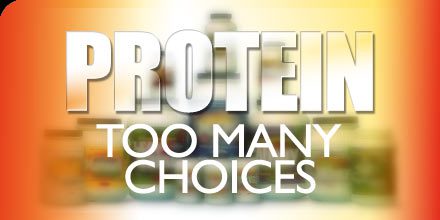Protein Choices: Too Many to Choose From
With so many protein choices on the market today, from protein powders, bars, shakes, RTDs, cookies, brownies, cereal, yogurt, donuts, etc. — knowing what to look for is half the battle. Most of the time without looking at the ingredients all you read on the label is all the great things the product can do for you and you generally base your decision off of their marketing (which isn’t always the best idea as many brands tend to lie or exaggerate on their packaging).
This article which you are about to read will hopefully shed some light on the topic and help you to understand what the protein on the back of your container means and does to help you narrow down your protein choices and decide what you would want to consider spending your hard-earned money on.

There are some simple facts which you must know in order to understand this article. Protein is the building block of muscle — without it, your tissues cannot repair themselves from intense training. There are four calories of energy per gram of protein. Also in the mix are something called Amino Acids.
What Are the Benefits of Protein and Having Protein Choices?
Protein is an essential macronutrient that plays a crucial role in maintaining overall health and well-being. It is comprised of amino acids, which are the building blocks of tissues, muscles, enzymes, hormones, and other important molecules in the body. Including a variety of protein choices and sources in your diet offers numerous benefits:
- Muscle Growth and Repair: Protein is vital for the growth, maintenance, and repair of muscles and tissues. It is particularly important for individuals engaged in physical activity or strength training.
- Weight Management: Protein can help you feel full and satisfied, reducing overall calorie intake. It also has a higher thermic effect, meaning it burns more calories during digestion compared to carbohydrates and fats. Including protein in your diet can support weight loss and weight maintenance.
- Metabolism Support: Amino acids from protein are necessary for various metabolic processes, including the production of enzymes and hormones. This can help regulate metabolism and maintain energy levels.
- Immune Function: Some immune cells and antibodies are made up of proteins. A sufficient intake of protein can help support a healthy immune system, aiding in the body’s defense against infections.
- Tissue Health: Protein is essential for the maintenance of healthy skin, hair, nails, and other connective tissues. Collagen, for example, is a protein that plays a crucial role in skin elasticity and joint health.
- Enzyme Function: Enzymes are proteins that facilitate various biochemical reactions in the body, including digestion and nutrient absorption.
- Hormone Regulation: Some hormones, such as insulin and growth hormone, are protein-based and help regulate various physiological processes.
- Blood Sugar Control: Protein can help stabilize blood sugar levels by slowing down the absorption of glucose from carbohydrates.
- Satiety and Appetite Control: Protein-rich foods tend to be more filling and can help reduce cravings and overeating.
- Bone Health: Protein is essential for maintaining bone density and strength. Adequate protein intake is necessary for overall bone health.

Having a variety of protein choices is important for several reasons:
- Nutrient Diversity: Different protein sources provide a range of essential nutrients, including vitamins, minerals, and fats. Diversifying your protein choices helps ensure you get a broader spectrum of nutrients.
- Avoiding Dietary Boredom: Consuming a variety of proteins makes your meals more interesting and can prevent dietary boredom, helping you adhere to a balanced diet.
- Meeting Dietary Preferences and Restrictions: Different people have various dietary preferences and restrictions. Having a variety of protein sources allows individuals to choose options that align with their dietary needs, whether they are vegetarian, vegan, pescatarian, or omnivorous.
- Environmental and Ethical Considerations: Opting for a variety of protein sources, including plant-based options, can have a lower environmental impact and align with ethical concerns related to animal welfare.
Common protein choices and sources include lean meats, poultry, fish, eggs, dairy products, legumes (beans, lentils, chickpeas), nuts, seeds, tofu, tempeh, and various plant-based meat substitutes. It’s important that your protein choices align with your dietary preferences and nutritional needs. Consulting with a healthcare professional or registered dietitian can help you create a balanced diet that meets your specific requirements.
Is There Such Thing as the Best Protein Choice?
There isn’t a single “best” protein choice that universally applies to everyone, as the ideal protein source can vary depending on individual dietary preferences, nutritional needs, and health goals. The best protein choice for one person may not be the same for another. Here are some factors to consider when selecting protein sources:
- Dietary Preferences: Your dietary preferences play a significant role in determining the best protein choice for you. If you’re a vegetarian or vegan, plant-based protein sources like legumes, tofu, tempeh, and seitan will be your primary options. If you consume animal products, lean meats, poultry, fish, eggs, and dairy products are available choices.
- Nutritional Needs: Your specific nutritional needs depend on factors such as your age, gender, activity level, and health conditions. For example, athletes and individuals looking to build muscle may require more protein than sedentary individuals. Pregnant or breastfeeding women also have increased protein needs. Consult a healthcare professional or registered dietitian to determine your specific protein requirements.
- Health Goals: Your health goals can influence your protein choices. If you’re aiming to lose weight, choosing lean protein sources with lower fat content may be beneficial. For those seeking to gain muscle, protein-rich foods with a balance of amino acids are important. If you’re managing chronic health conditions like heart disease or diabetes, you may need to consider protein sources that align with your dietary restrictions and health guidelines.
- Environmental and Ethical Considerations: Some individuals prioritize the environmental impact and ethical aspects of their food choices. In such cases, plant-based proteins or sustainably sourced animal products may be preferred.
- Food Allergies and Sensitivities: If you have allergies or sensitivities to certain foods, it’s essential to choose protein sources that are safe for you. Common allergens include nuts, soy, dairy, and shellfish, so be mindful of potential allergens in your protein choices.
- Taste and Texture Preferences: Personal taste and texture preferences can influence your protein choices. Some people may enjoy the taste and texture of certain protein sources more than others, making it easier to incorporate them into their diets.
- Cost and Accessibility: The cost and availability of protein sources can also be a factor. Some proteins may be more affordable or readily available in certain regions, which can influence your choices.
Ultimately, the best protein choice is one that aligns with your individual needs, preferences, and goals while providing a balanced intake of essential nutrients. A well-rounded diet often includes a variety of protein sources to ensure you obtain a broad spectrum of nutrients. If you’re unsure about which protein sources are best for you, consider consulting with a registered dietitian or nutritionist who can provide personalized guidance based on your unique circumstances.
Protein Choices You Should Consider
The function of protein is to help support lean muscle tissue, aid in the production of hormones and enzymes, and support immune function. People who exercise have a higher daily protein requirement than those who don’t work out. Protein also helps speed up the metabolism since it takes energy to maintain lean muscle mass at rest.
Let’s take a look at the various protein choices available on the market.
Whey Protein
The most widely used and consumed of all protein choices is whey protein. Whey protein is highly absorbable and provides the highest concentration of the leucine, isoleucine, and valine. They play a key role in the muscle-building process and also support immune function.
Whey concentrate is one of the least expensive forms of protein powder you can find on the market today. Some people have a hard time digesting concentrates which leave them bloated and gassy. Some people live with it, and some people look for something else.
Whey isolates are one of the quicker absorbing proteins available on the market today, although pricey, it isn’t the most expensive. You will find almost all of the containers of isolates have very low if any amounts of carbohydrates in them.
Hydrolyzed whey protein has some of the benefits of whey while providing highly absorbable peptides that can have anabolic effects. This is by far the most expensive protein you will be able to find.
Casein Protein
Casein protein is a slow digesting protein. It can be slowly absorbed for 5-7 hours which makes it a great choice for a pre-bed supplement. Casein protein is also a good idea to use during the day to keep you full and to keep a constant supply of protein available between meals or snacks if you have a long period of time between them. The glutamine content in casein is very high which can help increase recovery and boost immune function. In terms of protein choices and what’s available, casein is your best choice if you like eating up until right before bed.
Milk Protein Isolate
Milk protein contains both whey and casein proteins. This protein is full of amino acids from both whey and casein protein.
Soy Protein Isolate
While not one of the hottest selling of the protein choices available, soy protein is a vegetarian source of protein. It has been shown to enhance thyroid hormone output, which helps increase the metabolism and aids in fat loss. The isoflavones found in the soy can help lower cholesterol and triglyceride levels. Soy is also loaded with glutamine, arginine, and BCAAs.
There are forms of soy protein concentrate found in soybeans, tofu, and soymilk. These are not the same as soy protein isolates. Soy products can be estrogenic in men and can cause water retention and bloating.
Egg Albumin
Cooked egg whites are a good source of egg albumin. Egg albumin which has been known as the traditional protein has an amazing amino acid profile and is still one of the best whole food protein sources that you can get. Not only are they good for you, but eggs are relatively inexpensive.
You will also find some protein blends containing egg albumin due to its great profile. It is not uncommon to find it in meal replacements or sold solely as a protein powder.
Some Great Whole Food Protein Choices
Below are some of the best whole food protein choices.
Chicken Breast
Chicken breast is a relatively low-fat, high-quality protein source. It contains high doses of BCAAs and has a good potassium-to-sodium ratio (which can positively influence water balance). It is always best to try and get in as many whole foods as possible before using protein supplements. You can make many different platters with chicken which makes it very versatile come meal time.
Top Sirloin Steak
Top sirloin is a lean protein source with an excellent potassium-to-sodium ratio, it provides iron and good amounts of the amino acids alanine and lysine, which can help support energy and lean body mass. It also contains a great amount of B12, selenium, zinc, and phosphorous. Again, if you have it available, whole foods are a much better choice than protein supplements.
Tuna
This is another lean protein source that provides an excellent amount of BCAAs. Canned versions are not only convenient, but they are also inexpensive sources of protein. They also sell tuna in sealed packages as well. Tuna can be put on crackers or in a salad or even ate straight out of the can/package. Tuna is a very nutrient dense choice having several minerals and vitamins found in it including niacin, selenium, B6, thiamin, phosphorous, potassium, and magnesium. It also has omega-3 fatty acids in it which are the good fats that we all need in our diet which help with cardiovascular health.
Salmon
Salmon has a high amount of BCAAs in as well as being loaded with omega-3 fatty acids. Salmon is a great source of protein and one of the better fish you can eat in terms of health benefits. It is great for cardiovascular health. Salmon is also loaded with minerals and vitamins such as selenium, niacin, B12, phosphorous, magnesium, and B6.
Nuts
Nuts such as cashews, walnuts, and almonds (just to name a few) are not only a great snack full of protein, but they also have many health benefits. Nuts help lower cholesterol and decrease the risk of heart disease. They are also loaded with vitamins and minerals which add to their already outstanding profile.


*Disclosure: This article may contain affiliate links or ads, which means we earn a small commission at no extra cost to you if you make a purchase through these links. These commissions help support the operation and maintenance of our website, allowing us to continue producing free valuable content. Your support is genuinely appreciated, whether you choose to use our links or not. Thank you for being a part of our community and enjoying our content.
PLEASE CONSIDER SHARING THIS ON YOUR SOCIAL MEDIA TO HELP OTHERS LEARN MORE ABOUT THIS TOPIC.






